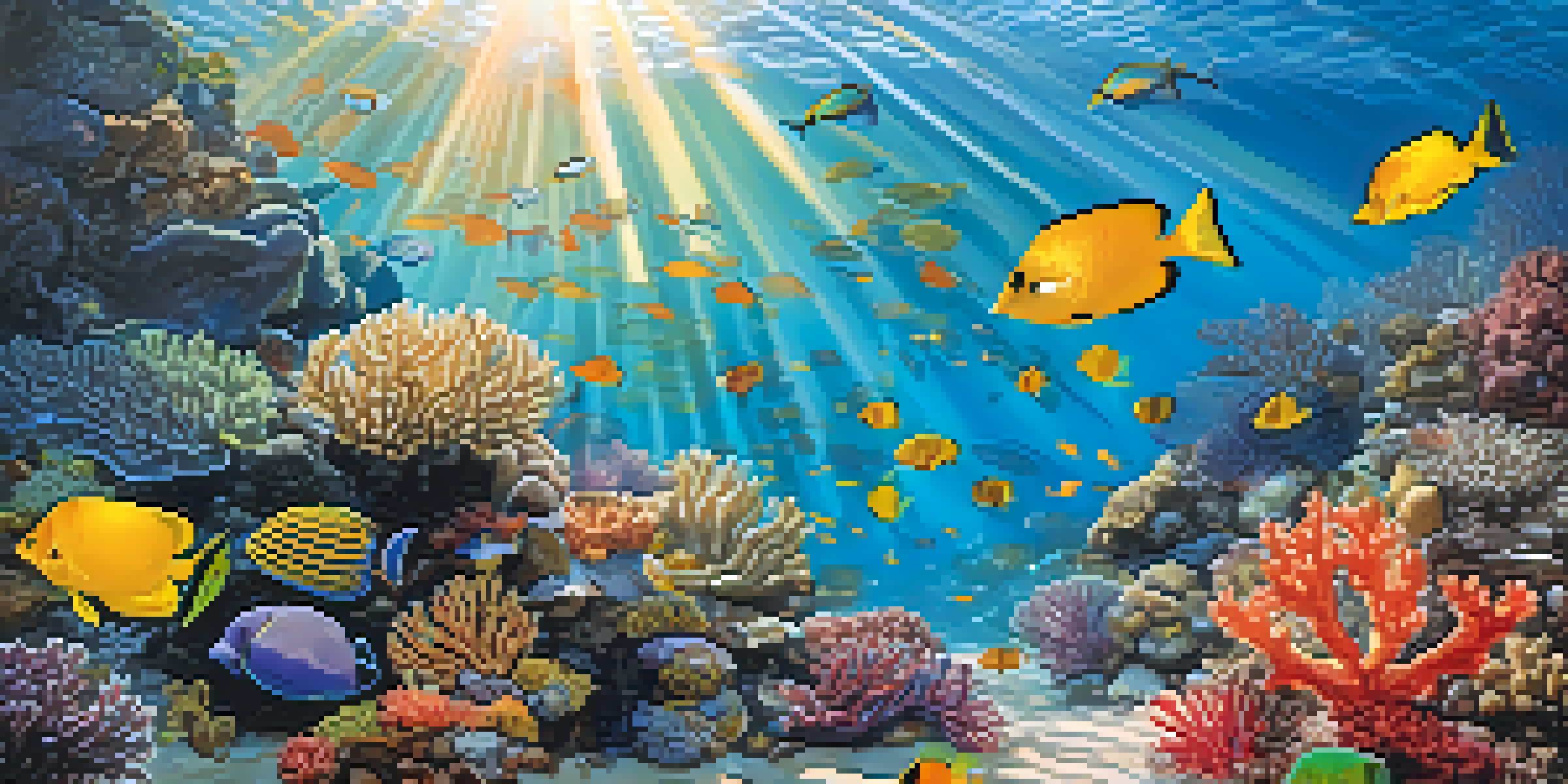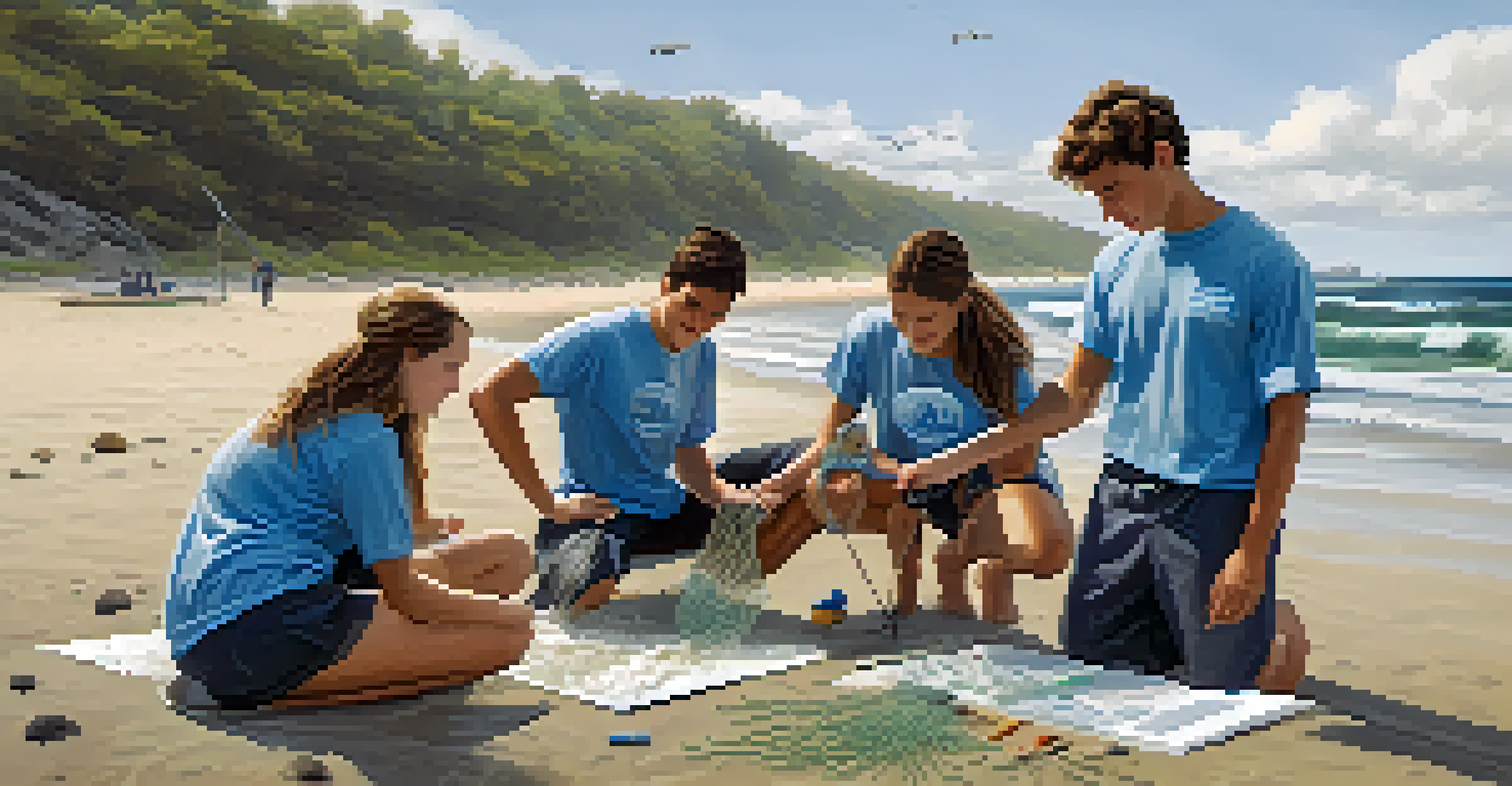Educational Opportunities in Marine Science: Honolulu Focus

Overview of Marine Science Education in Honolulu
Honolulu serves as a vibrant hub for marine science education, thanks to its unique location in the Pacific Ocean. The city's rich biodiversity and cultural significance make it an ideal setting for students interested in studying marine ecosystems. From coral reefs to deep-sea environments, the educational opportunities here are vast and varied.
The sea, once it casts its spell, holds one in its net of wonder forever.
Several institutions, including the University of Hawaii, offer specialized programs that cater to different aspects of marine science. These programs often emphasize hands-on learning, allowing students to engage directly with the ocean through field trips and research projects. This experiential approach not only enriches their education but also fosters a deep appreciation for marine conservation.
Moreover, Honolulu's strong community of marine scientists and advocates creates a supportive environment for students. Networking opportunities abound, with many chances to connect with professionals in the field. This vibrant community enhances the educational experience, making it not just about learning from textbooks but also about real-world applications.
Top Institutions for Marine Science in Honolulu
The University of Hawaii at Manoa is a premier institution for marine science, offering undergraduate and graduate programs that cover a range of topics. This university is renowned for its research facilities, including the Hawaii Institute of Marine Biology, which provides students with access to cutting-edge technology and field research opportunities. Here, students can dive into marine biology, oceanography, and environmental science.

Another notable institution is the Kapi‘olani Community College, which offers an Associate's degree in marine science. This program is designed for students who want a solid foundation before transferring to a four-year institution. Classes often include field studies, giving students practical experience in marine environments right in their backyard.
Vibrant Marine Science Hub
Honolulu's unique location and rich biodiversity make it an ideal setting for marine science education.
Additionally, various private organizations and non-profits in Honolulu, such as the Oceanic Institute, offer unique training workshops and internships. These programs often focus on aquaculture and sustainable practices, crucial areas in marine science today. Students can gain valuable skills that enhance their employability and deepen their understanding of marine ecosystems.
Research Opportunities in Marine Science
Research is a cornerstone of marine science education in Honolulu, with numerous projects focusing on local ecosystems. Students often participate in ongoing research initiatives, which can range from studying coral reef health to investigating the impacts of climate change on sea turtles. This hands-on research not only enriches students' learning experiences but also contributes to critical conservation efforts.
Marine conservation is a vital component of the future of our planet. We depend on the oceans in so many ways, and we need to protect them.
Collaborative research efforts with local organizations and government agencies further enhance these opportunities. Students can work alongside experienced scientists, gaining insights into professional practices and methodologies. Such collaborations can lead to internships and even job offers post-graduation, making them invaluable for career development.
Moreover, the unique marine environments around Honolulu provide a living laboratory for students. With access to diverse habitats, they can observe and study a variety of marine species in their natural settings. This direct engagement with the ocean fosters a deeper understanding of marine science principles and the importance of ecological stewardship.
Internships and Work Experience in Marine Science
Internships play a crucial role in preparing students for careers in marine science, and Honolulu offers a plethora of options. Many local organizations, such as the Hawaii Wildlife Fund and the Pacific Whale Foundation, provide internship programs that allow students to gain practical experience while contributing to marine conservation efforts. These internships often involve fieldwork, research, and educational outreach.
Additionally, universities in Honolulu have strong ties with local industries, enabling students to secure internships that align with their career goals. Whether it's working on a research vessel or assisting in environmental policy development, these experiences are instrumental in bridging the gap between academic learning and professional application. They also help students build resumes that stand out in a competitive job market.
Hands-On Research Opportunities
Students in Honolulu can engage in practical research projects that contribute to marine conservation efforts.
Networking opportunities abound through these internships, allowing students to connect with professionals who can guide their career paths. Many interns find mentors who can provide valuable insights and advice, which is particularly beneficial in a specialized field like marine science. These connections can lead to job offers or recommendations for further studies, underscoring the importance of real-world experience.
Community Engagement and Volunteer Opportunities
Community engagement is a vital component of marine science education in Honolulu. Many students participate in volunteer programs that focus on marine conservation, such as beach cleanups and coral restoration projects. These initiatives not only help protect local ecosystems but also foster a sense of stewardship among students.
Local organizations often welcome volunteers, providing training and resources to ensure effective participation. This involvement enhances students' understanding of environmental issues and the importance of community action in conservation efforts. Plus, working alongside like-minded individuals creates a supportive network that can last well beyond their academic careers.
Volunteering also enriches the educational experience by allowing students to apply classroom knowledge in real-world scenarios. Whether it's conducting water quality tests or engaging in public awareness campaigns, these experiences deepen their commitment to marine science and underscore the significance of preserving our oceans for future generations.
Conferences and Networking Events in Marine Science
Honolulu hosts various marine science conferences and networking events that are invaluable for students. These gatherings provide a platform for emerging scientists to present their research, share ideas, and learn from established professionals in the field. Attending these events can be a game-changer for students looking to make connections and gain recognition in marine science.
Networking at these conferences often leads to mentorship opportunities, internships, and even job offers. Students can engage directly with industry leaders and researchers, learning about the latest advancements and trends in marine science. This exposure helps them stay informed and inspired, which is crucial for their academic and professional journeys.
Strong Community Support
A robust network of marine scientists and organizations in Honolulu provides students with valuable internships and mentorships.
Additionally, these events foster a sense of community among marine science enthusiasts. Students can connect with peers who share their passion, which can lead to collaboration on future projects or research initiatives. Overall, participating in these gatherings is an excellent way to expand one's horizons and build a professional network in the marine science community.
Conclusion: The Future of Marine Science Education in Honolulu
The future of marine science education in Honolulu looks bright, with increasing interest in environmental issues and ocean conservation. As more students recognize the importance of protecting marine ecosystems, educational institutions are likely to expand and innovate their programs. This growth will provide even more opportunities for aspiring marine scientists to engage, learn, and contribute to the field.
Moreover, the collaboration between universities, local organizations, and government agencies will continue to strengthen the educational landscape. By working together, these entities can develop programs that address current challenges facing our oceans, such as climate change and pollution. This collaborative approach will not only benefit students but also the wider community and the health of marine environments.

In a world where marine ecosystems are increasingly threatened, education plays a crucial role in fostering future leaders in marine science. By investing in educational opportunities in Honolulu, we empower the next generation to take action, ensuring the preservation and sustainability of our oceans for years to come.